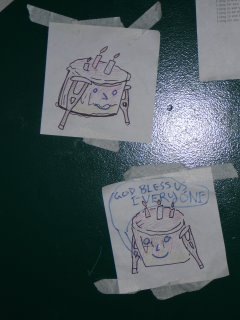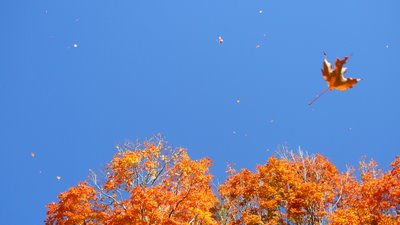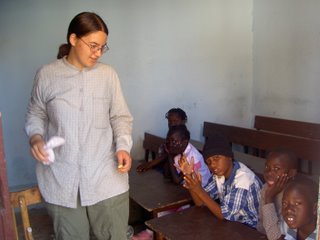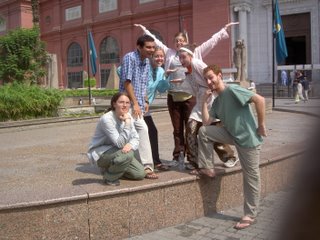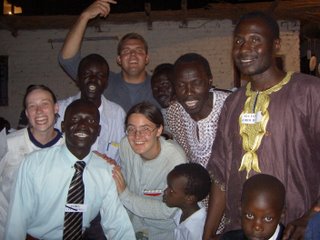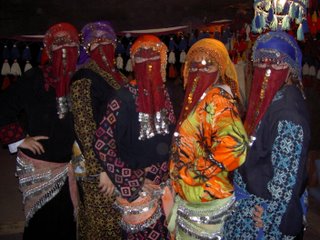As long as I've been putting up more about my religion classes, I thought it would be good to wedge this in there. It's pretty long.
The final for Ancient Christianity was to make a timeline for tracking like, 5 different themes through the time period covered by the course. I put mine on giant sheets of paper on the walls of the stairwell and lived there for a few days. It covered something like the range from AD 0 (or 0 CE if you prefer.. even though neither really happened...) to AD 500 (CE). The idea was to use our map of socio/historical themes to get a better-contextualized idea of what happened to our little Jesus Movement of the 1st century.
Our professor warned us that he would choose a 150 year interval, and in the three or four hours of the exam, without the aid of our timeline, we would have to come up with a coherent framework and narrative through which to understand what was going on.
We got to write it in those little blue books. Typing was not allowed.
I liked mine, but I didn't get a chance to pick it up at the end of last year, and thought it had been thrown out. But, I just discovered a small pile of unclaimed Rel 153 essays in the Classics/Religion Lounge.
This is a 150-year slice what I learned in Ancient Christianity:
***** 5/8/06
During the period of 300-450, we see what happens when Christianity lets the power trip 'go to its head,' so to speak. All through the 200s, Christianity has been growing in number and in social class despite sporadic persecution. The entire Roman Empire experienced an abrupt change of policy between Diocletian's order of the Great Persecution in 303 and Constantine & Licinius' 312 Edict of Milan. In what many Christians considered a miraculous victory of good over evil, Constantine defeated the forces of Licinius who had since gone against the Edict ofMilan and, in 330, established Constantinople (formerly Byzantium, the capitol of the Byzantine Empire) as the new headquarters of the Roman Empire. It seems that with one of their own in charge of the government, influential Christans found themselves with the time, security, and leiser to quarrel bitterly over internal matters. Though, arguably, when your people run the empire, everything is an internal matter.
First, some background of the situation leading up to Constantinople. At the turn of the century, Diocletian held the Roman scepter & made it clear that he did not much enjoy Christians in his Empire. This is probably a result of the sect having grown increasingly visible all through the 3rd century and stubbornly refusing to adopt acceptable measures of Roman nationality and piety by burning incense and sacrificing to the traditional gods. Furthermore, Diocletian had found it necessary to add a title to his name along the lines of "Lord and Master," which, in the minds of Christians, only continued to identify him and the Roman Empire as the earthly kingdom set up in opposition to the promised kingdom of heaven. During the Great Persecution, many Christian lands, books, and posessions were confiscated and/or destroyed. Sone Christians saw this as a chance to enact their own peculiar form of glory and did not wait for the Romans to find them but loudly claimed to have hidden Christian texts in order that they might be more certainly & efficiently martyred.
By this time, Christians had infiltrated the social classes so that even Emperor Diocletian's wife, Prisca was a Christian (she somehow survived Diocletian's own perseucution only to be executed by Licinius in 315) as well as one of his appointed teachers. While it is uncertain how Diocletian dealt with the problem of his wife's apparent religions persuasion, the appointed teacher (who had lived through the sporadic persecutions of the previous 40 years) was fired.
Lactantius found a new job teaching Constantine's oldest son Crispus and used his experience with the bulk of the church's persecution to chronicle how God dispenses judgement and nasty ends to all those who act against Him and His church.
One of Diocletian's political acts was the formation of the tetrarchy and dividing governance of the Roman Empire between the Western and Eastern halves. And so, we come to a point not much farther in the 4th century in which Constantine rules the Western part and Licinius presides over the Eastern part. Lactantius gives us some of the first records as to how Constantine later said he defeated his enemy after a vision instructed him to conquer in the sign of the Chi-Ro, a symbol for the name of Christ. Constantine declared that any god to grant him victory like that was good enough for him (Though given the pervasiveness of the Cult of the Sun God and Constantine's religions actions later, it is unclear whether he continued in the name of the sign under which he conquered, or in the name of the Unconquered Sun). Whatever his actual beliefs, it was also good enough for the Christian church.
After the Edict of Milan in 312, signed by the Constantine & Licinius which commanded that Christian properties (church lands) and posessions he returned to them and legalized Christianity (so that the Roman Empire would be in the divine favor of their God), and after Constantine defeated Licinius (who shortly after the Edict ofMilan, turned more vehemently against the Christians), the church hailed him Caesar with all the enthusiasm expected for the return of a different coming King. The Praise for Constantine is absolutely glowing. With a new Emperor uniting the halves of Rome, and a new capitol in Constantinople (in 330), many Christians must have considered their kingdom come.
But, the brief political unity was not indicative of any kind of church unity. No longer needing to defend themselves from the Roman empire, the church found it expedient to persecute itself. Many had survived through the Great Persecution by handing over their illegal texts to be confiscated, and many others had burned incense to the emperor or Roman gods to obtain their required receipt of worship. However, many others had survived by enduring torture and there was a general feeling in the church that those which had done anything less than hold their ground to the extreme in all areas of Christian living did not deserve to remain in communion with the church. On the level of the commoners, this conflict passed, aided by decrees such as Stephan's from the 3rd century that those fallen away (capitulating to demands of the emperor) need not be re-baptized in order to return to the church. However, this was not so small an issue when one city elected a bishop who had purportedly turned over sacred texts during the Great Persecution. In response, another city refused to recognize the offending bishop & nominated their own, producing the mild fracture that was the Donatist Schism.
The next hot discussion was the Pelagian Controversy which disputed the nature of sin [and] brought the necessity of Christ into question.
But the most significant controversy of the early 300s was the Arian Controversy. The Arian Controversy erupted in the early 300s over a comment made by Arius in one of his sermons regarding the nature of the Trinity (which, no matter what sort of commentary you try to make on it, you're wrong). Arius' Champion, Eusebius, quotes him on saying "We are persecuted because we say our God had a beginning." No longer persecuted for hiding sacred manuscripts, the leading characters in Christianity at the time persecuted one another for not making the correct statements*.
*(This is not to say that the church no longer dealt with external heresy. Shenoute and Augustine of Hippo both found ocassion to write against the heresies of Gnosticism and Manicheanism)
In the other corner, Athanasius of Alexandria weighed in against Arius and Eusebius. Christian theology had now gone from being the surprising statemtns of unlearned fishermen to an intellectual toy of the elite: Church leaders were appalled at the sneaky, underhanded tactics employed by the Arians to deceive the masses. In the markets, commen men sang catcy Arian jingles and the sellers attempted to discuss the finer points of the implications regarding the nature of a time when the Son was Not.
Disgusting as this perversion of intellectual spirituality must have seemed to the bishops, it was the loaded banter among bishops which concerned Constantine. After al his work to unify the empire politically and religiously (as religion was a key component of Roman nationality), the religions end was threatening to shatter.
(disclaimer: seriously, I particularly suck at remembering dates of coucils.)
Alarmed, he called for a Council of the Biships to meet in Nicea and decide on a common policy. After all, the pholosophers could agree to disagree. Why couldn't the church? So in .. 331?29? shoot. [later edit: 325] several hundred weathered, Roman-persecution-surviving bishops gathered together in Nicea, this time with guards and government "encouragement" to decide on a statement which the entire church could agree to. Among the topics discussed were: what is the nature of the Sonship? (A very agreeable, mostly neutral statement makes its way into the Nicean Creed), what to do about Arius? (Excommunicate him), What beliefs does the church agree to? (Nicean Creed), and as long as Constantine is getting some church and state unity (Which Ambrose of Milan, bless his heart, very much objected to), he wants 50 bound copies of unanimously canonical texts (The New Testament Canon). With the exception of a few bishops, everyone signed the agreements and went home to promtly write their own suggestions to their respective churches of what books were good to believe, good to consider, good for instruction, and which should be avoided altogether. Though they agreed on a good number of texts, everyone had a slightly different idea of exacctly which books belonged in which categories.
No matter, Constantine had his Canon and the bishops quieted down for a little while, until Eusebius requested a Council about a decade later which mostly consisted of tricking the bishops into condemning Athanasius and Athanasius rushing back to Alexandria & Constantinople to protest while Eusebius and his followers snuck off to Jerusalem to get Arius recalled into the church.
Meanwhile, a new brand of Christianity was growing in the deserts of Northern Africa. The aescetics began as Copts who, finding it easier to live alone in poverty than to pay taxes to the city, fled to the deserts of Egypt. Athanasius writes glowingly about St. Anthony and the classic aescetic battle against bodily desires. As Copts continued to be poor and tax-evasive, and as this expression of piety became more trendy, people came from great distances to consult the Desert Fathers or to join them.
The idea of the monastic community probably began with Macrina who cleverly evaded marriage in order to retain her virginity, lived at hom with her Christian mother, was instrumental in influencing her brothers, among them, Gregory of Nyssa and Basil the Great, into leaving their lives of secular oratory and turning their attention to spiritual matters. The community she started in her home was one in which servants were treated with the same recognition of humanity bestowed on their masters (though one must have servants in order to properly run a household), and one which took in orphans and the sick off the streets to care for them. This monastic community structure is instructive to Basil, after whom it becomes a sort of theme & variation across the Roman Empire. The intentions of the community vary as well, from Macrina's house of charity to what Theodoret describes as a gymnasium for training against the devil. In this sort of community, the main focus is on personal triumph and control of the body. The heroes of these commmunities are the likes of Symeon Stylites, Shenoute of Atripe, and Anthony the Great.
To hear Theodoret describe it, one would think that the monks are in a daily competition to see who can withstand the greatest mortification of the flesh. It is regrettable that we don't have much more from the hands of the three aforementioned supermonks themselves on the particular subjects of their perceptions of the body (Though we have much in the way of political advice from Symeon, "Amazement" at heresy from Shenoute, and philosophy from Athanasius) than Senoute's comment that the body is not, as some gnostic heretics claim, a prison for the soul, but rather - to the righteous - the body is rest and light. This comment is coming from a man who was described at being delighted by missing a majority of his flesh.
These men were not freakish aberrations. They were popular. People flocked to hear "a word" from the wisdom of the Desert Fathers. Shenoute was in charge of a monastary in which he treated the brothers & sisters there with all the discipline and punishment which he bestowed upon himself. Symeon ascended the pillar, it is said, because his crowds of admirers were becoming too much like pests. Though it seems he was the first to ascend the pillar, many others followed him [on their own pillars], and from then on, the emperor found it convenient to be in good correspondance with at least one pillar monk. The publicity, number, and classes of people going o speak with the pillar monk meant that staying in touch with him was like keeping a finger on the pulse of that area of the empire.
And, monks could influence the empire by more tahn just writing. By 387, the status (and behavior) of Christians had completely reversed, and it was now the monks who persecuted the Pagans, for by the decree of Theodosius II, heresy in the empire was now punishable by death. Julian the Apostate's attempt from 361 to 363 to revive Paganism in the empire by displacing Christians from their jobs and encouraging Pagans to imitate the Christians' piety and charity failed miserably.
Cyril of Alexandria even found the monks useful for theological enforcement within the church, particularly at the Council of Ephesis in 431 which met to condemn Nestorius' interpretation of Christ as not being fully God at birth. It was essentially the same argument as the hundred years prior, only this time concerning more specifically Jesus' status during his time on Earth. Cyril had promptly condemned Nestorius the year prior, and now there would be a Council so that all the bishops could agree to condemn Nestorius and again agree on a church statement regarding the issue.
Interestingly, Cyril invited Shenoute and his band of monks to attend the coucil of Ephesus. Shenoute was a huge fan of Athanasius who spoke adamantly against the Arian idea that there was a time when the Son was Not, and now Shenoute was attending the Council of Ephesus, weighing in against the Nestorian idea that there was a time when Christ was not God.
And, in what seems like a cosmic historical setup, Nestorius made the mistake of placing holy scriptures on the ground too close to Shenoute who promptly used his nearly 100-year-old frame and nearly 100-year-old Canon to give Nestorius (and his outgrowth of a nearly 100-year-old controversy) a sound beating before all the other bishops present (who shouted in unison his worthiness). Shenoute then had the pleasure of hearing the Council agree to Cyril's 12 Anathemas against Nestorius and then outliving him.
The theological battle, however, was far from over. The church continued to be bothered by the likes of Etyches and the Monophysites who claimed that Christ was of human nature, subsumed by God, and simply condemning Nestorius did not settle the matter of how the same Jesus could be both mortal and immortal. These opinions were to be officially decided on by the Council of Chalcedon which met in... either 451 or 461, but either way, that's out of the range of this narrative. Pope Leo I, Champion of the "Truly Man & Truly God" echo of the Formula of Union from 433 had claimed Roman jurisdiction over the entire Church, just as Canon 28 would soon grant Constantinople appointing power over the bishops in the Asia Minor area. In the West, Church & State were kept as separate parallel concepts by the Church's continued existence in the midst of various barbarian takeovers. The East, however, had no such problem with barbarians, and the Church & State became that much more enmeshed to the point that (as evidenced in Canon 28) the emperor was that much the head of church proceedings. But again, I'm beginning to leave my time range.
The meshing is entirely evident, however, in the reign of Theodosius and his related Empresses, and neither church nor state was left unchanged. In Western or Eastern, the crown exerts much more influence over the systems of the church, and vice versa. The Apostolic Constitutions, a clever forgery which appears in the late fourth century shows the extent to which Chistian life was regulated by the church. And, the Church's sheer size and influence caused Honoria to consider it most expedient to become a Christian. This ushers in an era of Emperors & Empresses with all the drama & intrigue of the 1st-century Roman Emperors, except that these bear the name of "Christian." And, having come into an earthly power over an earthly kingdon of Christians, the rulers find it most convenient to use church concepts to manipulate power leverage which manifests in 450 (conveniently enough for this narrative) in Pulcheria's marriage to Marcian after being consecrated a Christian virgin, and so, essentially, wed to Christ. The symbolism and uses of these kedia bonds to Thodosius are simply too good of loaded images to pass up.
Thus we have seen the transformation of the church climb the food chain of political power. Those who were last have become fist, the meek have inherited the earth (and become subsequently less meek), and the persecuted, cursed, and reviled have come into their kingdom. The Western Kingdom will not last much longer, and the extensive jurisdiction of the church will become the network that holds the different geographies in communication. The Eastern political power will subsume the church until they are arguably one in person, consubstantial.
But now I'm letting my religious bias get carried away, so I'd better find something profound to conclude with before I make some kind of comment on how an eartly union of Church and State can never retain being either Truly Church or Truly State, but seems to operate as some confused muddle of the worst (and often most politically expedient) characteristics of each.
Oops. Too late **
**for retracting the previous paragraph or for adding other, possibly relevant, various occurences that, despite not being mentioned here, are also important parts of history, and deserve recognition elsewhere.
 From the last 2 or 3 months, I have a good deal of pictures and little stories that go with them which I am forgetting in the lack of their telling. It's also time to have my waking hours consumed by final exams and projects, so now is not a good time to put together a post of stories and pictures. I was planning on putting it all together into one post, but in the interest of sanity, I will try many simple photo posts.
From the last 2 or 3 months, I have a good deal of pictures and little stories that go with them which I am forgetting in the lack of their telling. It's also time to have my waking hours consumed by final exams and projects, so now is not a good time to put together a post of stories and pictures. I was planning on putting it all together into one post, but in the interest of sanity, I will try many simple photo posts. 


